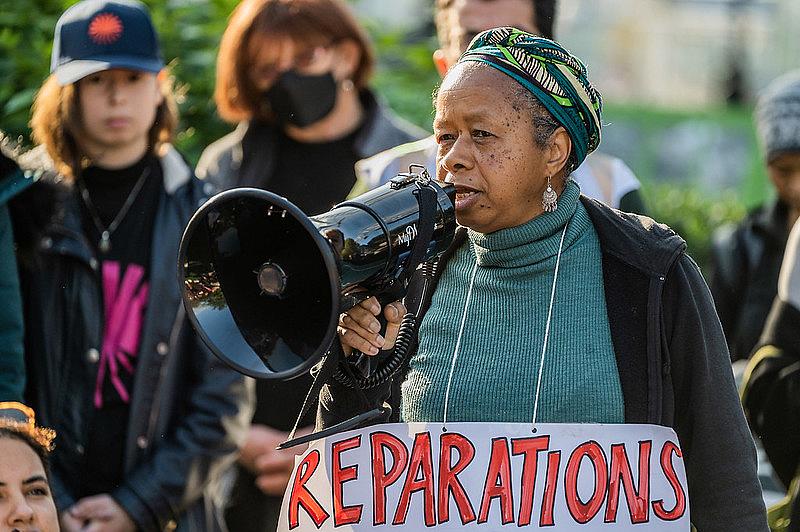Can reparations improve the health of Black Americans?

Photo by Inside Our Future via Creative Commons/Flickr
When a Black baby is born in the United States, their fight to live a healthy life begins. Compared to the white baby in the delivery room next door, they’re more likely to be impoverished as children and chronically ill as adults.
Even if they succeed economically, they’re still expected to live fewer years than white Americans.
My project for the Center for Health Journalism 2023 National Fellowship will explore how reparations for Black Americans could shrink the health gap.
Health disparities did not arise by accident – and they’re not explainable by genetics. They’re the result of the nation’s legacy of policy-driven racism.
Redlining is a prime example.
When the federal government denied Black residents homeowner loans beginning in the 1930s, and allowed mortgage lenders to do the same, it divided more than neighborhoods. It also segregated resources such as grocery stores.
The refusal of markets to establish stores in Black and low-income communities led to the creation of “food deserts.”
Today, one-in-five Black residents lack access to affordable, fresh fruits and vegetables. Just 8% of Black people live in a census tract with a supermarket, compared to 31% of white Americans.
In previous reporting, I spoke with an Atlanta farmer who invested his retirement funds toward land to grow food. He’d become tired of watching Black residents struggle to access groceries.
The area had only one “grocery store within miles from the area of the farm,” he told me.
Research has linked the legacy of redlining to high rates of chronic disease, lower life expectancy, poor COVID-19 outcomes and other health challenges that disproportionately affect Black Americans. But redlining is just one example of how policy fueled health disparities; Black people live with the consequences of racist policies that go back centuries.
While some community members, such as the farmer I mentioned, find ways to address the issues impacting their health and quality of life, others call on the government to atone for Black suffering through reparations.
The U.S. planned to give freed Black people 40 acres of land after slavery ended, but that promise was short-lived. Although several other groups have received federal funds for past harms, not a single dime has been given to Black Americans.
That could change — and so could health outcomes.
The movement for reparations has picked up speed, particularly in California. In 2020, the state formed the AB 3121 Task Force to Study and Develop Reparations Proposals for African Americans. The group’s work to create a state-level blueprint is arguably the furthest the U.S. has come to extending reparations in recent history. I will explore efforts to address health inequities in California through cash payments and other requests.
This project will look strongly at poverty-related mental health issues and how reparations may provide a remedy. Poverty is deemed a public health issue for a good reason. It can lead to stress and mental illness. It exposes people to violence, which can be traumatizing..
I will follow Black people with depression, anxiety and other illnesses. Additionally, I will look at the connection between generational poverty and post-traumatic stress disorder.
Reparations in the form of cash payments have the potential to ease the mind by increasing access to safer housing, better education, and healthy food. This could translate into overall better health.
The California task force and reparations advocacy groups aren’t asking for money alone — they also want policies to protect Black folks from future harm. That may involve removing lead in drinking water in redlined neighborhoods or reducing the rate of death among Black mothers and infants. Such policies could benefit Black people who may not qualify for cash payments. I intend to explore the various requests from Black community members and organizations.
I also will look at the reparations conversation in the Christian community. During the civil rights movement, leaders such as Dr. Martin Luther King, Jr. advocated for eradicating poverty to end suffering. While his vision has yet to come to pass, some ministers today have taken up the cause to push for reparations, while others oppose reparations. It is important to explore the split on this subject within Christianity in America.
Lastly, I’ll include a reporter’s notebook examining my experience producing this project. The piece will also have my own family history: a tale of generations of men and women who lived, fought, and died in Pensacola, Fla., after fleeing nearby southern towns after slavery.

